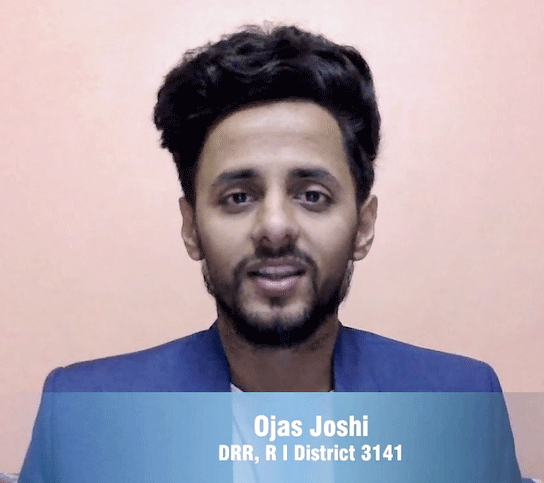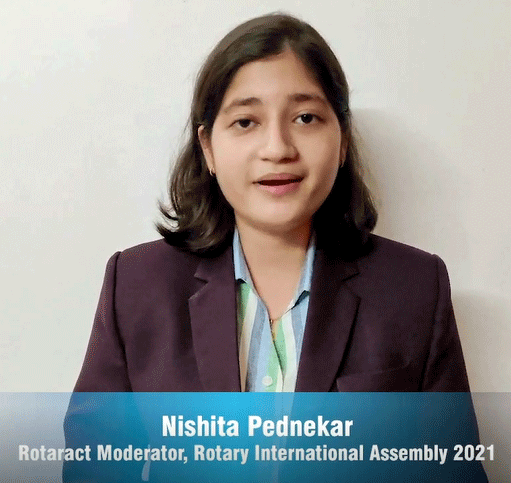
One of the critical goals of Rotary clubs is to listen and recognise what Rotaractors want and give them an opportunity to shape their experience by being more flexible, said RID Valarie Wafer from Canada, anchoring a session for Rotaractors that saw participants from Europe, Africa, Australia, Brazil, Japan and South Asia. She was addressing a session at the zone institute.
Rotarians must continue their dialogue with Rotaractors and reach out to them for ideas and suggestions, she said. Samantha Fewster, chair, Rotaract Australia Multi-District Information Organisation (MDIO), said “Rotaract offers an incredible opportunity for young people to learn and grow with other people in a supportive environment at a similar stage in their life. We learn leadership and business skills, and other useful skills through our service to the community.” She asked Rotaractors to apply these skills in their daily lives, workplace and local communities. The new skills will help them if they want to take leadership roles in Rotary in the near future, she said.
The decision to elevate Rotaract on par with Rotary, she said, will make “years of service in Rotaract count when Rotaractors choose to join a Rotary club. This means that young people will be able to take positions that were denied to them previously for want of experience.” Making Rotaract a part of Rotary will “allow a wider demography of people to take on leadership roles to better represent their communities and bring unique perspectives to the table, so that Rotary can truly change the world,” said Samantha.
Age relaxation
On the upper age limit for Rotaractors being removed, Ojas Joshi, DRR, RID 3141, said this has enabled the Rotaract clubs to decide on their projects, the impact they wish to create, and also the people that they want to engage with. “Many Rotaractors across the world can continue being Rotaractors while embarking on their Rotary journey,” he said.
Nishita Pednekar, past DRR, RID 3170, said the removal of the upper age limit wouldn’t deter young individuals from joining Rotaract. “We join this organisation with the aim of self-development by serving the community,” she said.
Patricia Kuhn, member, RI Rotaract Committee and special adviser to Trustees from Brazil, said TRF Trustees are encouraging Rotary clubs to work with Rotaract clubs on global grants. TRF has made it possible for “Rotaractors to use global grants in their projects. We first have to learn how to use this resource, and who can teach us better than the Rotarians themselves. Besides, this is also a way to get closer to Rotarians.”
On being the first Rotaractor from Brazil to be selected as special adviser to TRF trustees, Patricia said, “I have learned a lot from the trustees. They show us that when different generations work together, our knowledge and ideas come together to build an even more solid future.”
Rotary’s partnership with Toastmasters is an “exciting alliance,” said Karthik Kittu, past DRR, RID 3190, and founder president, Rotaract South Asia Multi-District Information Organisation (RSA MDIO). “This partnership will help Rotarians and Rotaractors grow personally and professionally. It will also help us strengthen the skills of Rotaractors and help them make a better impact in their communities,” he said.
Ronald Kawaddwa, chair, RI Rotaract and Interact Committee, Uganda, answering a question on whether dual membership for Rotaractors will be beneficial to Rotary, said, “Yes, it does in two ways. One, you are an equal member of both Rotary and Rotaract. Two, young Rotarians can be good mentors to Rotaractors who join Rotary clubs.” Rotary clubs, he said, should embrace younger members because they serve as ambassadors who will encourage Rotaractors to join their clubs.
Kazuho Sano, Rotaract vice-secretary, RID 2840, Japan, said that he is looking forward to play an active part in Rotary and is hopeful the newly-introduced Rotaract dues will not affect membership. “Students or working members on an average spend $300 for coffee annually. All we have to do is convert our coffee dollars as dues,” he quipped.
Yatin Sehgal, president, RSA MDIO, said the recent RI amendment that Rotaract clubs can be chartered with or without sponsoring Rotary clubs is a revolutionary decision. Talking about numbers, he said, “Over the past six months, we have seen an increase of 1.65 per cent in the growth of Rotaract clubs as compared to the last three years. In Southeast Asia, the response is amazing because we already have around 261 Rotaract clubs coming up.”
From RI President Holger Knaack’s home district in Germany, Doris Grimm, chair, RI Rotaract Committee, said that it was beneficial to have direct representatives as advisors to both the RI board and TRF. “By having advisors to these two boards, we show that we are not only talking but actually acting upon Elevate Rotaract,” she added. Calling the youth of today “a vehicle of social change,” Akansha Sanghvi, charter president, RAC Mumbai Zenith, said to promote fellowship through service “people must join hands and come together for a cause that can create everlasting change.”







